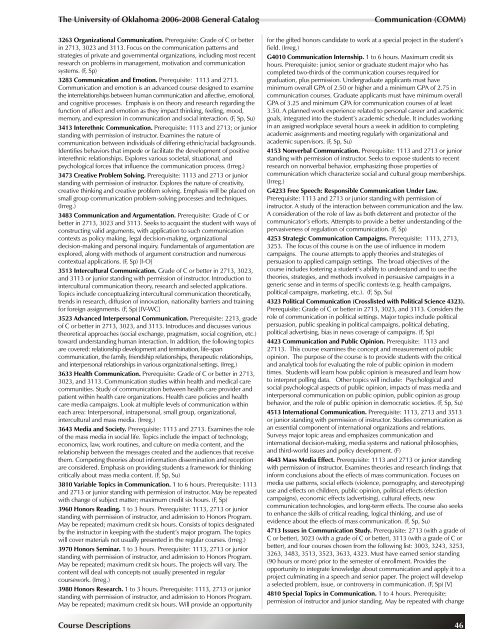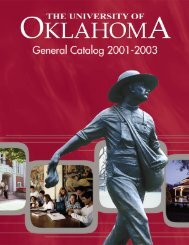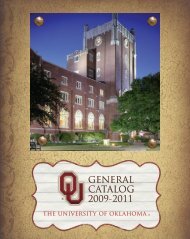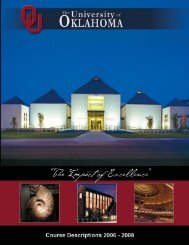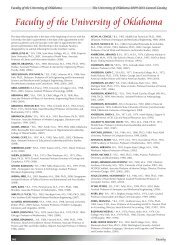2006-08 Course Descriptions - Catalog - University of Oklahoma
2006-08 Course Descriptions - Catalog - University of Oklahoma
2006-08 Course Descriptions - Catalog - University of Oklahoma
You also want an ePaper? Increase the reach of your titles
YUMPU automatically turns print PDFs into web optimized ePapers that Google loves.
The Uni ver sity <strong>of</strong> <strong>Oklahoma</strong> <strong>2006</strong>-20<strong>08</strong> Gen eral Cat a logCommunication (COMM)3263 Organizational Communication. Prerequisite: Grade <strong>of</strong> C or betterin 2713, 3023 and 3113. Focus on the communication patterns andstrategies <strong>of</strong> private and governmental organizations, including most recentresearch on problems in management, motivation and communicationsystems. (F, Sp)3283 Communication and Emotion. Prerequisite: 1113 and 2713.Communication and emotion is an advanced course designed to examinethe interrelationships between human communication and affective, emotional,and cognitive processes. Emphasis is on theory and research regarding thefunction <strong>of</strong> affect and emotion as they impact thinking, feeling, mood,memory, and expression in communication and social interaction. (F, Sp, Su)3413 Interethnic Communication. Prerequisite: 1113 and 2713; or juniorstanding with permission <strong>of</strong> instructor. Examines the nature <strong>of</strong>communication between individuals <strong>of</strong> differing ethnic/racial backgrounds.Identifies behaviors that impede or facilitate the development <strong>of</strong> positiveinterethnic relationships. Explores various societal, situational, andpsychological forces that influence the communication process. (Irreg.)3473 Creative Problem Solving. Prerequisite: 1113 and 2713 or juniorstanding with permission <strong>of</strong> instructor. Explores the nature <strong>of</strong> creativity,creative thinking and creative problem solving. Emphasis will be placed onsmall group communication problem-solving processes and techniques.(Irreg.)3483 Communication and Argumentation. Prerequisite: Grade <strong>of</strong> C orbetter in 2713, 3023 and 3113. Seeks to acquaint the student with ways <strong>of</strong>constructing valid arguments, with application to such communicationcontexts as policy making, legal decision-making, organizationaldecision-making and personal inquiry. Fundamentals <strong>of</strong> argumentation areexplored, along with methods <strong>of</strong> argument construction and numerouscontextual applications. (F, Sp) [I-O]3513 Intercultural Communication. Grade <strong>of</strong> C or better in 2713, 3023,and 3113 or junior standing with permission <strong>of</strong> instructor. Introduction tointercultural communication theory, research and selected applications.Topics include conceptualizing intercultural communication theoretically,trends in research, diffusion <strong>of</strong> innovation, nationality barriers and trainingfor foreign assignments. (F, Sp) [IV-WC]3523 Advanced Interpersonal Communication. Prerequisite: 2213, grade<strong>of</strong> C or better in 2713, 3023, and 3113. Introduces and discusses varioustheoretical approaches (social exchange, pragmatism, social cognition, etc.)toward understanding human interaction. In addition, the following topicsare covered: relationship development and termination, life-spancommunication, the family, friendship relationships, therapeutic relationships,and interpersonal relationships in various organizational settings. (Irreg.)3633 Health Communication. Prerequisite: Grade <strong>of</strong> C or better in 2713,3023, and 3113. Communication studies within health and medical carecommunities. Study <strong>of</strong> communication between health care provider andpatient within health care organizations. Health care policies and healthcare media campaigns. Look at multiple levels <strong>of</strong> communication withineach area: Interpersonal, intrapersonal, small group, organizational,intercultural and mass media. (Irreg.)3643 Media and Society. Prerequisite: 1113 and 2713. Examines the role<strong>of</strong> the mass media in social life. Topics include the impact <strong>of</strong> technology,economics, law, work routines, and culture on media content, and therelationship between the messages created and the audiences that receivethem. Competing theories about information dissemination and receptionare considered. Emphasis on providing students a framework for thinkingcritically about mass media content. (F, Sp, Su)3810 Variable Topics in Communication. 1 to 6 hours. Prerequisite: 1113and 2713 or junior standing with permission <strong>of</strong> instructor. May be repeatedwith change <strong>of</strong> subject matter; maximum credit six hours. (F, Sp)3960 Honors Reading. 1 to 3 hours. Prerequisite: 1113, 2713 or juniorstanding with permission <strong>of</strong> instructor, and admission to Honors Program.May be repeated; maximum credit six hours. Consists <strong>of</strong> topics designatedby the instructor in keeping with the student’s major program. The topicswill cover materials not usually presented in the regular courses. (Irreg.)3970 Honors Seminar. 1 to 3 hours. Prerequisite: 1113, 2713 or juniorstanding with permission <strong>of</strong> instructor, and admission to Honors Program.May be repeated; maximum credit six hours. The projects will vary. Thecontent will deal with concepts not usually presented in regularcoursework. (Irreg.)3980 Honors Research. 1 to 3 hours. Prerequisite: 1113, 2713 or juniorstanding with permission <strong>of</strong> instructor, and admission to Honors Program.May be repeated; maximum credit six hours. Will provide an opportunityfor the gifted honors candidate to work at a special project in the student’sfield. (Irreg.)G4010 Communication Internship. 1 to 6 hours. Maximum credit sixhours. Prerequisite: junior, senior or graduate student major who hascompleted two-thirds <strong>of</strong> the communication courses required forgraduation, plus permission. Undergraduate applicants must haveminimum overall GPA <strong>of</strong> 2.50 or higher and a minimum GPA <strong>of</strong> 2.75 incommunication courses. Graduate applicants must have minimum overallGPA <strong>of</strong> 3.25 and minimum GPA for communication courses <strong>of</strong> at least3.50. A planned work experience related to personal career and academicgoals, integrated into the student’s academic schedule. It includes workingin an assigned workplace several hours a week in addition to completingacademic assignments and meeting regularly with organizational andacademic supervisors. (F, Sp, Su)4153 Nonverbal Communication. Prerequisite: 1113 and 2713 or juniorstanding with permission <strong>of</strong> instructor. Seeks to expose students to recentresearch on nonverbal behavior, emphasizing those properties <strong>of</strong>communication which characterize social and cultural group memberships.(Irreg.)G4233 Free Speech: Responsible Communication Under Law.Prerequisite: 1113 and 2713 or junior standing with permission <strong>of</strong>instructor. A study <strong>of</strong> the interaction between communication and the law.A consideration <strong>of</strong> the role <strong>of</strong> law as both deterrent and protector <strong>of</strong> thecommunicator’s efforts. Attempts to provide a better understanding <strong>of</strong> thepervasiveness <strong>of</strong> regulation <strong>of</strong> communication. (F, Sp)4253 Strategic Communication Campaigns. Prerequisite: 1113, 2713,3253. The focus <strong>of</strong> this course is on the use <strong>of</strong> influence in moderncampaigns. The course attempts to apply theories and strategies <strong>of</strong>persuasion to applied campaign settings. The broad objectives <strong>of</strong> thecourse includes fostering a student’s ability to understand and to use thetheories, strategies, and methods involved in persuasive campaigns in ageneric sense and in terms <strong>of</strong> specific contexts (e.g. health campaigns,political campaigns, marketing, etc.). (F, Sp, Su)4323 Political Communication (Crosslisted with Political Science 4323).Prerequisite: Grade <strong>of</strong> C or better in 2713, 3023, and 3113. Considers therole <strong>of</strong> communication in political settings. Major topics include politicalpersuasion, public speaking in political campaigns, political debating,political advertising, bias in news coverage <strong>of</strong> campaigns. (F, Sp)4423 Communication and Public Opinion. Prerequisite: 1113 and27113. This course examines the concept and measurement <strong>of</strong> publicopinion. The purpose <strong>of</strong> the course is to provide students with the criticaland analytical tools for evaluating the role <strong>of</strong> public opinion in moderntimes. Students will learn how public opinion is measured and learn howto interpret polling data. Other topics will include: Psychological andsocial psychological aspects <strong>of</strong> public opinion, impacts <strong>of</strong> mass media andinterpersonal communication on public opinion, public opinion as groupbehavior, and the role <strong>of</strong> public opinion in democratic societies. (F, Sp, Su)4513 International Communication. Prerequisite: 1113, 2713 and 3513or junior standing with permission <strong>of</strong> instructor. Studies communication asan essential component <strong>of</strong> international organizations and relations.Surveys major topic areas and emphasizes communication andinternational decision-making, media systems and national philosophies,and third-world issues and policy development. (F)4643 Mass Media Effect. Prerequisite: 1113 and 2713 or junior standingwith permission <strong>of</strong> instructor. Examines theories and research findings thatinform conclusions about the effects <strong>of</strong> mass communication. Focuses onmedia use patterns, social effects (violence, pornography, and stereotyping)use and effects on children, public opinion, political effects (electioncampaigns), economic effects (advertising), cultural effects, newcommunication technologies, and long-term effects. The course also seeksto enhance the skills <strong>of</strong> critical reading, logical thinking, and use <strong>of</strong>evidence about the effects <strong>of</strong> mass communication. (F, Sp, Su)4713 Issues in Communication Study. Prerequisite: 2713 (with a grade <strong>of</strong>C or better), 3023 (with a grade <strong>of</strong> C or better), 3113 (with a grade <strong>of</strong> C orbetter), and four courses chosen from the following list: 3003, 3243, 3253,3263, 3483, 3513, 3523, 3633, 4323. Must have earned senior standing(90 hours or more) prior to the semester <strong>of</strong> enrollment. Provides theopportunity to integrate knowledge about communication and apply it to aproject culminating in a speech and senior paper. The project will developa selected problem, issue, or controversy in communication. (F, Sp) [V]4810 Special Topics in Communication. 1 to 4 hours. Prerequisite:permission <strong>of</strong> instructor and junior standing. May be repeated with change<strong>Course</strong> <strong>Descriptions</strong> 46


